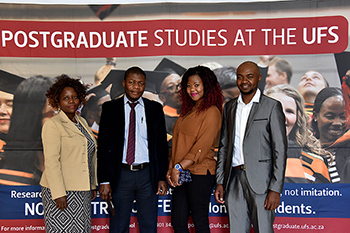Latest News Archive
Please select Category, Year, and then Month to display items
19 November 2018
|
Story Charlene Stanley
|
Photo Charlene Stanley
 Prof John Mubangizi, Dean of the Faculty of Law, encouraged delegates at the Fifth Annual International Mercantile Conference to share ideas on best international practice in their various fields.
Prof John Mubangizi, Dean of the Faculty of Law, encouraged delegates at the Fifth Annual International Mercantile Conference to share ideas on best international practice in their various fields.
“Don’t say anything online that you wouldn’t want plastered on a billboard with your face on it.”
This famous quote by international tech expert Erin Bury should be a guiding light when it comes to online habits in the workplace, according to Francois Cilliers, UFS Lecturer in Mercantile Law.
In his presentation Could Social Media be the Gateway to Employment Discrimination? he warned that employees have a responsibility not to bring their employers in disrepute through their comments on social media.
“Posts, updates, tweets, and comments are considered to be publications and can therefore never be seen as privileged information,” he explained.
Responsibility on employees and employers alike
He pointed out that employers also had a responsibility regarding the way in which they use the information about prospective employees obtained via social media.
“Nowadays, approximately 75% of companies hire through social media. In the US, recruiting companies spend hours researching candidates, making full use of what they can find on social media. It was found that 50–80% of employers frowned upon posts and pictures featuring drug and alcohol abuse, profanity, and bad grammar.”
He warned that employers needed to tread lightly, as a decision not to employ someone as a result of information on the prospective employee’s political views and sexual orientation could constitute unfair discrimination as set out in the Employment Equity Act.
“An employer who wishes to use a screening process (utilising social media) has to prove that the information and the process is objectively necessary and can be justified with reference to the inherent requirements of the job,” he explained.
“As technology and electronic systems advance, so too should the applicable labour laws.”
Cilliers’ presentation formed part of the Fifth Annual International Mercantile Law Conference recently hosted by the Faculty of Law on the Bloemfontein Campus.
Incorporating new technology in teaching and research
“This conference is an opportunity to share ideas on best practice in what is perceived as a ‘difficult’ field within Law,” said Prof John Mubangizi, Dean of the Faculty of Law, as he opened the proceedings. Topics in the discussion sessions ranged from Racism in the workplace and The underrepresentation of females in the judiciary, to Decriminalisation of cannabis: A recipe for healthy employer-employee relations?
“Conferences such as these help us to take advantage of the newest developments in technology to advance our teaching and research,” said Prof Mubangizi.
“To quote Einstein: ‘We can’t solve problems by using the same kind of thinking we used when we created them.’”
One, two, three – is your thesis done?
2016-08-26

Winners of the UFS Three-Minute-Thesis competition.
From the left: Thutukile Jita, Natural/Social Sciences
PhD winner; Saheed Sabiu, Natural/Health Sciences
and audience-favourite PhD winner;
Matseliso Mkotywa, master’s audience-favourite
winner; Zingisile Mbo, Natural/Health Sciences
master’s winner.
Photo: Charl Devenish
“Next time you have three minutes to spare, try to formulate your master’s or doctoral thesis,” says Dr Henriëtte van den Berg, Director of the Postgraduate School at the University of the Free State (UFS).
The much anticipated Three-Minute-Thesis (3MT) Competition took place at the UFS Bloemfontein Campus on Friday 19 August 2016. Diverse and interesting research projects were discussed, giving one a glimpse into months and even years of hard work and dedication.
A learning opportunity for candidates
The 3MT competition is an international event founded at the University of Queensland, Australia. It is divided into master’s and PhD categories. At the UFS competition, the master’s section was dominated by the Medical and Natural Sciences, in contrast with the PhD section’s focus on Social Sciences. “The competition is a learning opportunity for our UFS candidates,” says Dr Henriëtte van den Berg.
Thought-provoking research presented
Interesting methodologies and research questions sustained the academic excellence the candidates pride themselves in. Saheed Sabiu, PhD candidate and winner, constructed his thesis around, Waste to Health: Corn silk in the Management of Kidney Diseases. “Use corn silk (white fibre around corn) in the same manner as a tea bag, to help manage kidney diseases,” says Sabiu.
Audience members also had the opportunity to ask the candidates questions relating to their thesis topic.
Winners at the event:
• Master’s winner: Zingisile Mbo
• PhD winner: Natural/ Health Science: Saheed Sabiu
• PhD winner: Natural/Social Sciences: Thutukile Jita
The winners of each category received a cash prize and will represent the UFS at the national 3MT competition, hosted by the UFS in November this year.